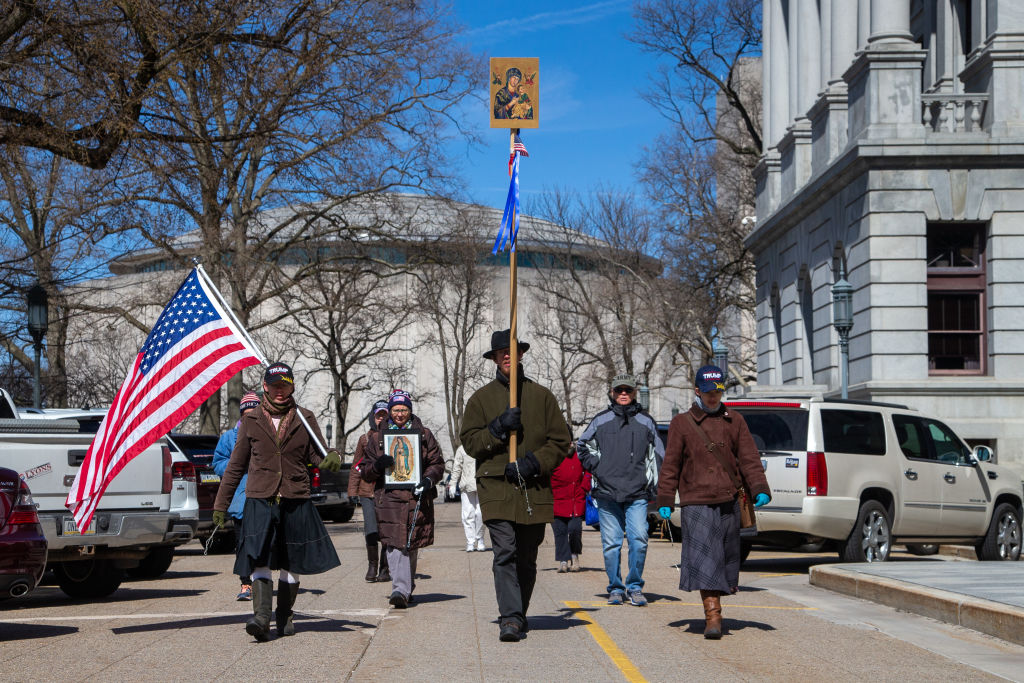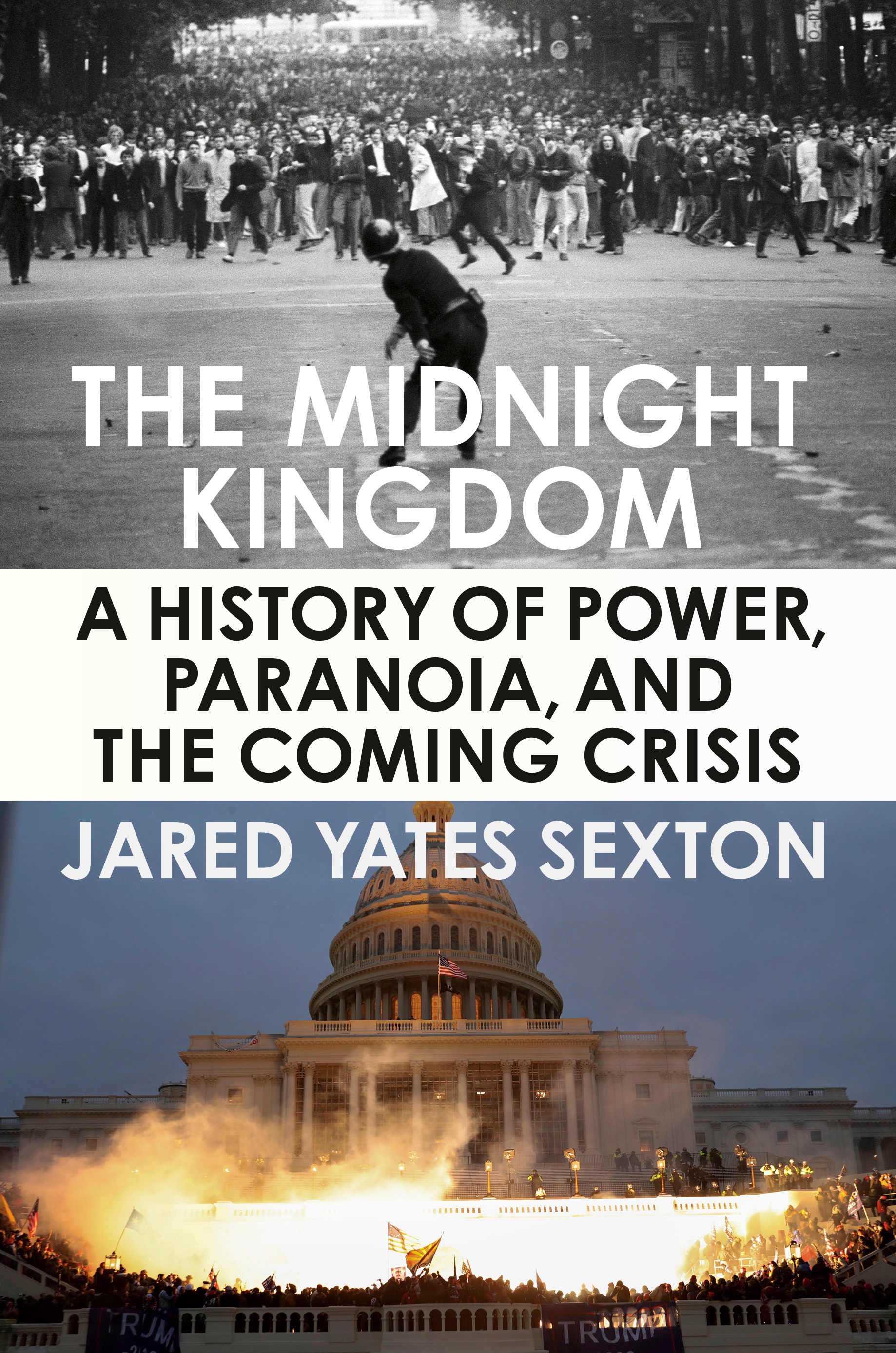
When I was a boy In Indiana, I lived in perpetual fear. These were the 1980s and so that fear took predictable forms, including the threat of nuclear devastation at the hands of the Soviet Union. Sometimes, during tornado drills in elementary school, teachers would tell us we were practicing for the inevitable atomic strike while reminding us how lucky we were to have been born Americans.
On Sundays, I huddled against the end of the hard wooden pews in my small Baptist church as the preacher sweated and begged God for Armageddon. The world had become too wicked. Too perverse. Satan had found an ally in Moscow and willing accomplices within the United States, including liberals, feminists, gays, and violent criminals who seemed to hide behind every corner. The Devil wasn’t an abstraction or a metaphor, but a malevolent being who could manifest in your living room. And his powers were immense and his influence omnipresent. Our sick culture’s movies, television shows, and music were demonic and designed to tempt us away from God.
If things were going to be put right, if Good was going to triumph over Evil, then it was going to require nothing short of war.
Read More: 3 Threats Christian Nationalism Poses to the United States
The conversations I heard back 30 years ago sound a lot like the ones I’ve been hearing recently. But what was largely kept behind closed doors is now the defining dialogue of a public and worrying movement. I first noticed it in 2016, as I reported from the crowds at Donald Trump rallies, and have since seen it dominate the Republican Party, conservative media, and watched it grow into an international political project.
And, to my horror, the specifics are the same. The world has been tainted. Society is decadent and depraved. Democracy is a danger and subject to manipulation by a satanic conspiracy. And, in order to put things right, any and all means, including extreme violence, is not only an option, but likely necessary.
What I did not understand then is that our congregation was being prepared to accept changes outside the walls of our tiny church. The fiery sermons laid the groundwork for political and economic actions that would otherwise seem cruel and unreasonable. Without the religious narratives, the idea of overturning elections, imprisoning political opponents, creating an oppressive system, or executing “enemies,” which I have heard called for many times now, might be met with some resistance.

In trying to understand these authoritarian energies, the rise of Christian Nationalism, and the crisis we face, my research has informed me that these narratives have followed very discernible and predictable cycles. Beginning with the merging of Christianity and state power in Rome, the tenets of the faith have been co-opted into aiding in the preservation and expansion of power. The religion’s persecution complex fuels larger concepts of apocalypticism that create life or death struggles where literally everything hangs in the balance and compromise and mercy are tantamount to suicide.
A philosophy of “righteous persecution,” forwarded by Saint Augustine, creates justification for oppression, telling true believers that inflicting suffering on sinners is justified if it is for their own spiritual benefit or the benefit of the faith. This has legitimized unthinkable horrors, including enslavement, genocide, colonization, and tyrannical systems that haunt our past and our present.
Our modern moment is once more defined by these concepts. The warnings that used to be relegated to Sunday mornings fill the halls of Congress and are repeated 24 hours a day on Fox News. Individuals and families that would have probably sat across the aisle from me all those years ago are now regularly posting pictures of themselves brandishing semiautomatic weapons with biblical quotes in the captions. And that’s only when they’re not retweeting QAnon conspiracy theories that tell the same horror stories that inspired other authoritarian movements like Nazism, Fascism, and have led to one annihilation and war after another.
The “solutions” are appalling and unsurprisingly they echo the extreme measures necessitated by a looming apocalypse. The evil traitors must be stopped at all costs. Some want them in prison, others need to see them swinging from every light pole. Virtually everything, including our government, elections, economy, and popular culture, are controlled by a sinister conspiracy that is, depending on the day, either explicitly the domain of Jewish puppet masters or simply the Devil himself at the controls, and so seizing power and using cleansing violence and the muscle of the state are the only means of deliverance.
Since reporting from those Trump rallies, I have watched with revulsion as the people I knew and loved lifted a reality television host to the status of messiah. It is yet another component of Christianity, the idea of a “divine agent” who becomes a tool of the almighty and executor of his will on Earth. There have been many, including Constantine in Rome, who assumed this mantle while promising to protect or expand Christendom and used its influence to wield enormous power. Dictators, demagogues, and tyrants have long anchored their status to this concept, and in an environment like ours, the time is ripe for anyone willing and shameless enough to grab the mantle and use it.
Already we have glimpsed the possible ramifications. It is evident in Russia with Vladimir Putin and in Hungary with Viktor Orbán, both of whom have weaponized these concepts in order to rig their political systems, dismantle democracy, and, in Putin’s case, justify an illegal war by claiming it is a defense against godless conspirators deadest on destroying the faith.
In America, we have seen suffering inflicted on refugees, boldfaced white supremacy and cruelty, attacks on gay and transgender Americans, open anti-Semitism, the destruction of Roe V. Wade, and even an attempted coup. These are all worrying examples of supposedly unthinkable developments this ideology serves. Whether it will enable further losses of civil rights and liberties, oppression, totalitarianism, and even war remains to be seen, but much will depend on our understanding of the very real nature of this threat.
This heretical ideology represents an existential crisis. Its gaining popularity and influence should serve as a wakeup call that the danger extends beyond Donald Trump or his cadre of fame-seeking flunkies. The terror that kept me and countless other young people awake at night in the past has escaped the confines of the church and now possesses millions of Americans the same way we once worried a demon might take over our bodies and our souls.
And let there be no doubt that history is very clear what the consequences are should we not exorcise this harmful spirit from the body politic.
More Must-Reads from TIME
- Caitlin Clark Is TIME's 2024 Athlete of the Year
- Where Trump 2.0 Will Differ From 1.0
- Is Intermittent Fasting Good or Bad for You?
- The 100 Must-Read Books of 2024
- Column: If Optimism Feels Ridiculous Now, Try Hope
- The Future of Climate Action Is Trade Policy
- FX’s Say Nothing Is the Must-Watch Political Thriller of 2024
- Merle Bombardieri Is Helping People Make the Baby Decision
Contact us at letters@time.com